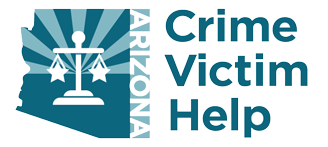Initial Contact
Who can I talk to about victim rights?
Anyone who has a role in the criminal justice system, such as law enforcement, prosecutors, courts, social workers, victim advocates, and corrections, can provide information about victims’ rights. This also includes non-governmental organizations that serve victims.
Most victims’ first contact with the criminal justice system is with law enforcement. Law enforcement must provide a victim with a form called the Victims’ Rights Request/Waiver Form, which includes essential information about victims’ rights.

As a case proceeds through the criminal justice process, law enforcement shares information with prosecutors, who often reach out to victims to provide information. Based on the level of a victims' involvement with a case, the Court may also share information with the victim.
What is the Victim Request or Waiver of Victim Rights form?
Arizona Law says that law enforcement agencies provide this form to victims during their first contact.

The form is meant to address a major complaint of crime victims: that they are not informed of their rights. The form informs victims of specific rights and other information, allows victims to request or waive certain rights, and provides victims with a method of designating a lawful representative if they want to. This form may vary depending on the jurisdiction or law enforcement agency that provides it (ex. some departments provide the form online).
Once completed, copies of the form may then be routed to appropriate agencies (such as prosecutors and the Court) as the case proceeds through the criminal justice system.
What rights can I request or waive on the form that is provided to me?
Some rights are given to victims automatically after the accused is formally charged with a crime, while other rights need to be requested. If a victim does not want a certain right, the victim can “waive” that right (give it up).
The rights that victims must request include the right to:
-
Be notified of the suspect’s release from custody.
-
Receive a copy of the terms and conditions of release.
-
Receive notification of scheduled court proceedings.
-
Speak with a prosecutor prior to a plea, dismissal, or trial.
-
Make a Victim Impact Statement.
-
Receive a copy of the presentence or predisposition report.
-
Receive notice of the defendant’s conviction (or adjudication), acquittal, or dismissal of charges.
-
Receive notice of sentencing or disposition results.

A law enforcement officer will provide a victim with the form where they can request or waive these rights by checking a box and signing the form.
Why might someone want to request or waive their rights?
Some victims may not want to be involved with the court proceedings as it moves through the criminal justice system or be notified of certain information. Waivers allow for a victim to say that they do not want to be involved or receive information.
On the other hand, some victims may want to be involved with the situation as the accused proceeds through the criminal justice system. By requesting their rights, the victim can say that they wish to be involved and to receive information.
What happens if I do not receive a Victims’ Rights Request/Waiver Form?
If a responding law enforcement officer does not have you fill out this form, it usually means that they did not identify you as the victim of the crime.

If you are a victim of the crime (as defined above) and you did not receive a Victims’ Rights Request/Waiver Form, you may want to contact the law enforcement agency that initially responded to learn more.
What other help is available outside of the criminal justice system?
Organizations such as victim assistance programs, family advocacy centers, child abuse treatment programs, support groups, and sexual and domestic violence shelters are set up throughout the state to help crime victims regain control over their lives. Some examples of victim assistance services are:
-
Emergency safe homes or shelters
-
24-hour crisis telephone lines
-
Crisis and long-term counseling
-
Advocacy for basic needs and victimrights
-
Court orientation and accompaniment
-
Accompanying to medical examinations
-
Educational services and resources
-
Transportation
-
Childcare

What is a victim advocate?
Victim Advocates are trained to offer essential information and support to victims of crime. This can include information about rights, emergency resources, help with court documents or appearances, and much more.
There are different types of crime victim advocates in Arizona, including law enforcement advocates, advocates with prosecutor’s offices and the courts, and advocates within social service agencies.
To talk to a Victim Advocate, start by contacting the law enforcement agency that responded to the situation and provided initial paperwork and information. You can also contact the Arizona Coalition to End Sexual and Domestic Violence Helpline to find the closest provider in your area.
If a case is being prosecuted against the person who committed the crime, contact the county attorney (or prosecutor) handling the case or the court where the case is being heard for information about victim advocates.
If a case is being prosecuted against the person who committed the crime, contact the county attorney (or prosecutor) handling the case or the court where the case is being heard for information about victim advocates.



